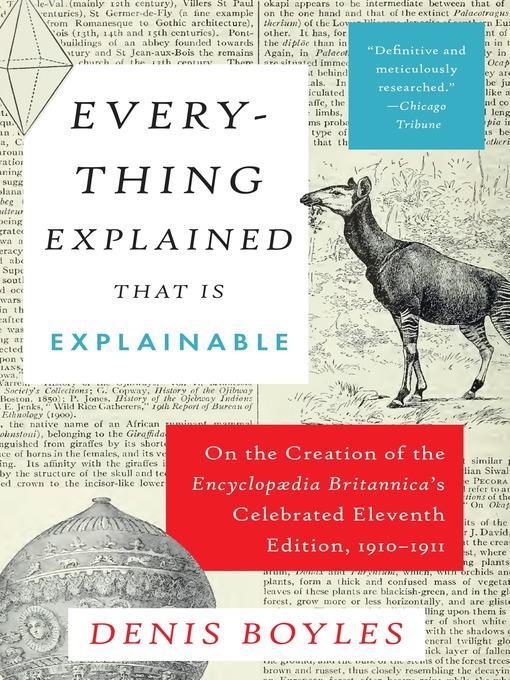
Everything Explained That is Explainable
On the Creation of the Encyclopaedia Britannica's Celebrated, 1910-1911
کتاب های مرتبط
- اطلاعات
- نقد و بررسی
- دیدگاه کاربران
نقد و بررسی

February 22, 2016
Boyles (How to Catch a Pig) ventures too deep into minutiae in this painstaking account of the venture behind the 11th edition of Encyclopaedia Britannica. The prime mover behind the 11th edition and central figure in this narrative was Horace Everett Hooper, an American entrepreneur and bookseller, who dreamed of a magnificent edifice of everything worth knowing, published as a single work, that would also be a profitable product. Those twin pursuits fill the book, with the business end taking pride of place over the actual construction of the encyclopedia and its epistemological considerations. Boyles emphasizes Hooper’s long association with the Times of London; Hooper felt that the gravitas of the newspaper brand would strengthen the Encyclopaedia Britannica readership while buoying the bottom line of the declining paper. Boyles also sketches the 11th edition’s editorial staff, focusing on editor-in-chief Hugh Chisolm and senior editor and indexer Janet Hogarth. Boyles certainly comes close to explaining everything there is to know about this publication—or maybe it’s just that by the end of the book, it’s hard to imagine wanting to know anything else.

March 15, 2016
How grit and determination created an encyclopedia for the modern world. In the 1890s, the Encyclopedia Britannica, then in its Ninth Edition, and the prestigious Times of London both were losing money. Critic and editor Boyles (Superior, Nebraska: Common Sense Values of America's Heartland, 2008, etc.), editor at large and columnist for Men's Health, focuses on a pair of audacious American bookmen, Horace Everett Hooper and Henry Haxton, who hatched a plan to revive the fortunes of both eminent publications. They would use the newspaper to sell the encyclopedia by barraging readers with "bombastic, full-page and direct-mail marketing," a form of advertising that the staid Times had never seen. For Hooper, promoting the encyclopedia was more than a way to make money: an idealist and anglophile, he saw the encyclopedia as "a tool for making the world a better, more civilized place by supporting his romantic vision of an English-speaking elite." He aimed, he said, "to make the Britannica self-sustaining and give it to Britain as a national trust." By the time the two men launched their plan, it was clear that the Ninth Edition was quickly becoming outdated. Scientific, technological, social, and political changes mandated new material, so they decided to produce supplemental volumes, hiring as editor respected journalist Hugh Chisholm, "a man of the world as well as a scholar." Throughout his tenure, the heroic Chisholm served as ballast to ground Hooper's wild enthusiasms. Boyles traces the evolution of the Britannica and the fate of the Times through lawsuits, battles for ownership, and ongoing money woes involving colorful, earnest, sometimes eccentric characters. It all culminated in the majestic 11th Edition: 40,000 long, erudite, yet accessible articles written by a huge number of renowned contributors. Boyles focuses mostly on the business end; his look at content is illuminating, though, and might well have been expanded. A well-researched, brightly told history of the men and women who saved a great compendium of knowledge.
COPYRIGHT(2016) Kirkus Reviews, ALL RIGHTS RESERVED.

April 1, 2016
A quick glance may lead one to believe that this is just another catchy trivia book. It is not; rather, what Boyles (journalism, political science, Catholic Inst. of Higher Studies; coauthor, The Man's Playbook) presents is a highly detailed account of the dubious history surrounding the creation and sale of the Encyclopedia Britannica, 11th ed., a slice of publishing history that includes aggressive marketing tactics, literary subscription services, brash American salesmanship, and sociocultural coercion to sell reference collections. While fascinating at times, the level of minutiae may be overwhelming to the casual reader. This is not a light read but an exhaustive account of a very specific set of events. VERDICT Boyle's account will appeal to a niche audience interested in the history of publishing and journalism and early 20th-century marketing. The balance of biography, history, and primary-source material makes for a compelling read more appropriate for scholarly readers than readers of popular historical nonfiction.--Gricel Dominguez, Florida International Univ. Lib.
Copyright 2016 Library Journal, LLC Used with permission.

























دیدگاه کاربران